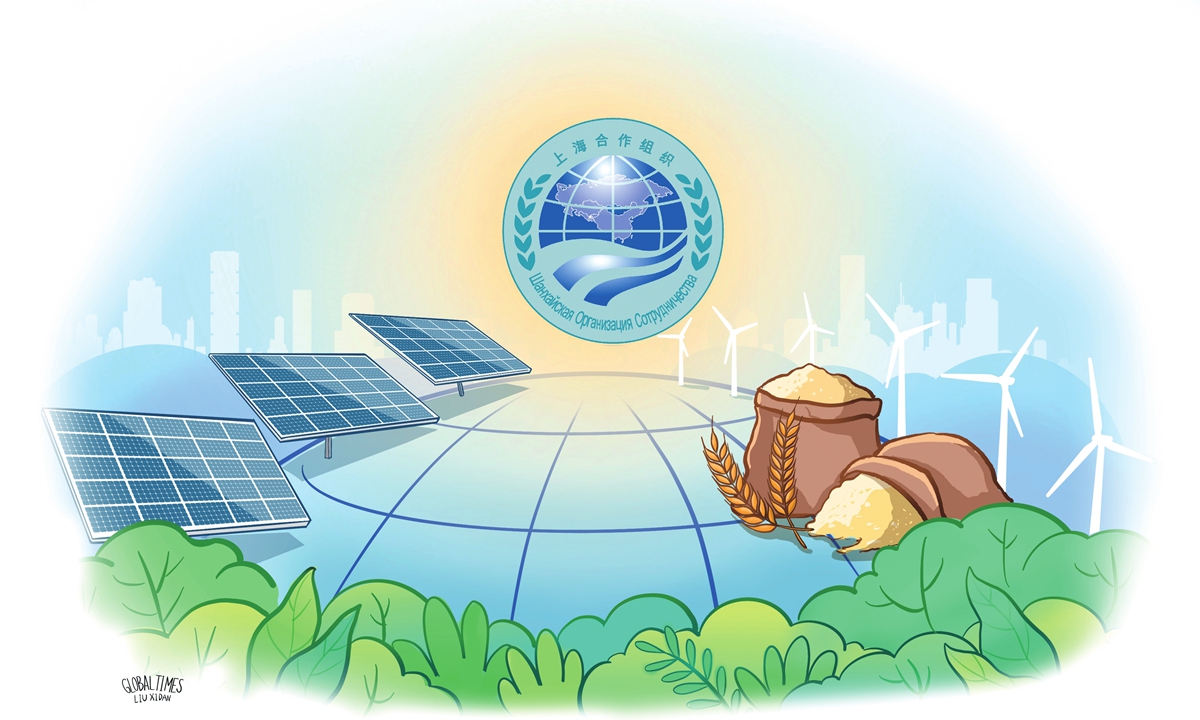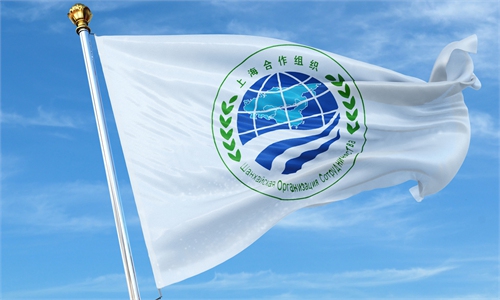In the turbulent world situation, the SCO can contribute with ‘Chinese solution’

Illustration: Liu Xidan/GT
Editor's Note:
Currently, geopolitical tensions and confrontations are driving the world into a period of turbulent transformation. The Shanghai Cooperation Organisation (SCO) is attracting more and more attention from countries, and its international appeal and influence continue to grow. Recently, at the fourth SCO High-end Forum and the 2023 Banqiao Forum held in Qingdao, East China's Shandong Province, experts in attendance discussed the current international situation and the development of the SCO. The Global Times has selected the viewpoints of three attending experts.
Zhang Ming, secretary-general of SCO
After 22 years of development, the SCO has maintained a strong and healthy momentum. In the face of new turbulence and changes in the world, the SCO has played an active role in regional and international affairs, becoming an indispensable constructive force in improving the international order, promoting regional and global development, and maintaining the security and stability of member states. In July this year, Iran gained full SCO membership. Belarus is expected to join the SCO next year. More countries and international organizations have expressed a desire to join or to cooperate.
Development is the eternal theme of human society, and economy and trade is the main driving force and engine of social development. In recent years, the international and regional situation has become complex, with a resurgence of Cold War mentality and group politics. International trade rules have been challenged, and economic globalization has encountered setbacks. The national security, social stability and economic development of SCO member states have faced great tests and they urgently need to deepen flexible cooperation and strengthen regional economic and trade exchanges.
The SCO Secretariat will continue to work with member states to actively promote the implementation of cooperation initiatives determined by the SCO Council of Heads of State. So far, member states have conducted multiple rounds of consultations on improving SCO work and establishing the SCO Counter-Narcotics Agencies, the Center for Combating Transnational Organized Crime, and the Information Security Center. Next, all parties will conduct in-depth research on the preparation for next year's summit and the improvement of SCO mechanisms.
Sun Zhuangzhi, director of the Institute of Russia, Eastern Europe and Central Asia of the Chinese Academy of Social Sciences
The regions where the member states of the SCO are located are facing a more complex and severe situation driven by the geopolitical competition among major powers. In the current international environment, the SCO should play a more active role and contribute to the construction of a just and reasonable international order with the "Chinese solution."
The development of the SCO faces multiple challenges. First, the escalating competition between major powers poses real dangers to the region where the SCO is located. Second, Western countries, led by the US, wield the stick of sanctions and promote small camps and view China as a competitor as it continues to rise, which is not conducive to regional stability. Unilateral sanctions, prominent international issues such as energy, food and climate, have had a negative impact on the process of globalization.
In the new international situation, the divide between the Global North and the Global South has widened, and geopolitical competition has created new development gaps. With expansion, the SCO needs to further improve existing economic cooperation mechanisms, establish new agreements, and expand the legal basis for cooperation. At the same time, attention should be paid to changes in the internal situation of the region where the SCO is located, supporting each other, implementing global development initiatives, and encouraging innovating thinking. By maintaining open and cooperative dialogue, the SCO can respond to the current extreme world political background.
Wu Hongwei, research fellow at the Institute of Russia, Eastern Europe and Central Asia of the Chinese Academy of Social Sciences
The current international order has undergone changes, with the old order being disrupted and a new order in the making. Faced with the international situation that could erupt into new crises at any time, many countries have a strong desire to join influential international mechanisms for protection.
After more than 40 years of reform, opening-up and rapid economic development, China has become the world's second-largest economy with greatly increased international influence. China's economic development and the reconstruction of the international order also provide excellent opportunities for the development of the SCO. For regional countries participating in the reconstruction of the Eurasian regional order, they urgently need a platform that can cover the entire Eurasian continent, and the SCO can fulfill this function.

